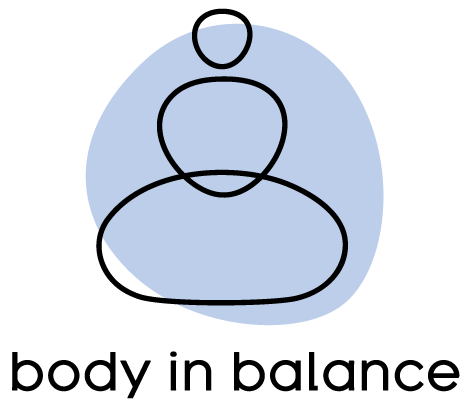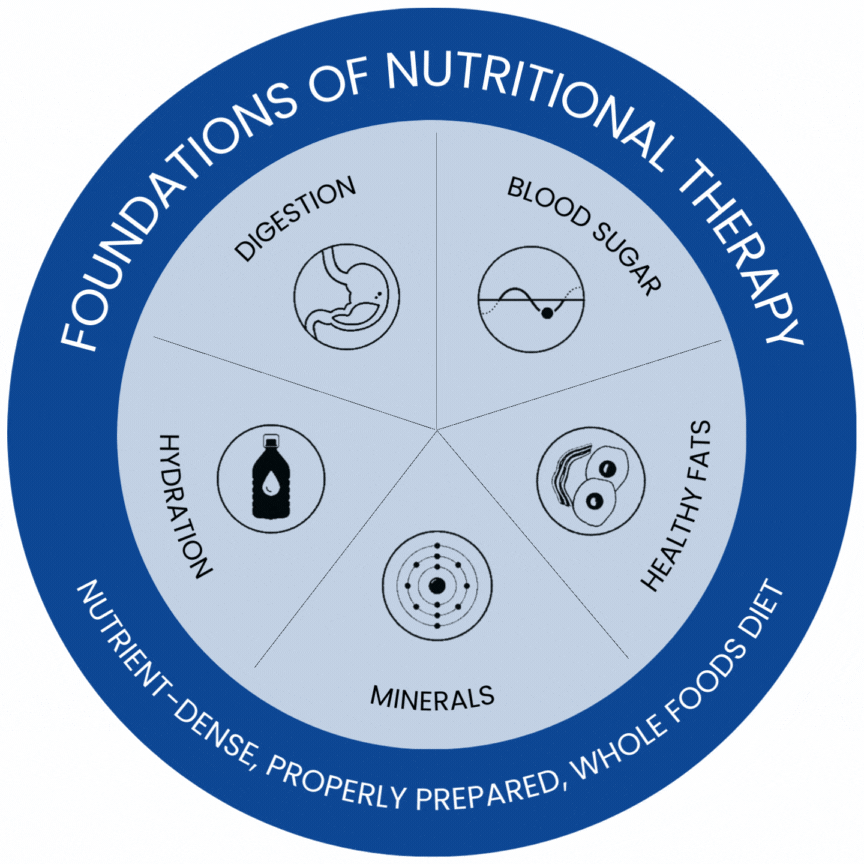What is Nutritional Therapy?
Nutritional therapy is based on the idea that optimal health can be achieved through a holistic and bio-individual approach to nutrition and lifestyle.
The nutritional therapy approach considers poor nutrition — and the consequential weaknesses in the body’s physiology — to be at the root of many modern health problems. To address this, nutritional therapy focuses on honoring the body’s innate feedback system and incredible capacity to restore, regenerate, and correct itself (when given the support to do so).
Nutritional Therapy Practitioners (NTPs) take a foundational, holistic approach to wellness by supporting the foundations of health.
The Foundations of Health:
A properly-prepared nutrient-dense whole foods diet
Optimal digestion
Blood sugar regulation
Fatty acid balance
Mineral balance
Hydration
When addressing a client’s health concerns and goals, my first step is to consider the these — which of the foundations need to be supported to address their concerns and achieve their goals? Where are they showing signs of dysregulation? What changes would have the biggest impact? Next, I consider how lifestyle factors — like sleep, stress, and movement, as well as personal histories and beliefs — might be also affecting someone’s health.
As an NTP:
I CREATE A CUSTOM PLAN FOR EVERY CLIENT.
Everyone has their own needs, preferences, and barriers. Because of this, I consider the goals, concerns, and bio-individuality of each client when making recommendations to restore balance to the body.I WORK TO SUPPORT AND GUIDE MY CLIENTS.
Ultimately, it is up to the client to take charge of their health and wellness. My training allows me to assess someone’s current diet and lifestyle, make recommendations, answer questions, provide education and resources, and accompany them on their healing journey. I am here to be a mirror, guide, educator, and coach to help them address their concerns, reach their goals, and establish a positive relationship with their bodies and food.I BELIEVE TUNING IN TO OUR BODIES IS PART OF THE BIGGER PICTURE.
Our relationships with our bodies, food, and selves are deeply connected and contribute to our relationships with others and the world itself. Investing in our own health ultimately benefits not just our bodies, but the collective whole.I BELIEVE IT’S NEVER JUST ABOUT FOOD.
The reasons we eat and connect (or don’t) with our bodies are heavily influenced by our individual histories and beliefs. Part of my passion is to help my clients see where these are having an impact and get curious about their own mind/body relationship.I AM NOT THE FOOD POLICE.
I am neither here to judge nor be attached to any specific outcome. I make dietary recommendations based on clients’ goals and concerns, and provide resources, education, and support. While I offer testing for potential food intolerances and sensitivities and suggest their elimination during the healing process, it is up to the client to make their own informed choices.I DO NOT SUBSCRIBE TO ANY DIETARY DOGMA, NOR DO I RECOMMEND IT.
There is no one-size-fits-all diet that works for everyone, and many restrictive diets are at risk for nutritional deficiencies. What works for one person will not work for everyone (nor is it guaranteed to continue to work in the future!). I believe we can all benefit from getting curious and exploring what foods and habits help us feel our best.I DO NOT RECOMMEND COUNTING CALORIES (with one exception...).
When the body is in a state of balance, we can trust its cues for hunger and satiety, particularly when we eat a diet primarily based on whole foods. I recommend mindful eating habits so that we are tuned into those cues and can respond accordingly. The only time I *do* recommend counting calories (for one day, or short-term) is to make sure a client is eating ENOUGH.I DO NOT DIAGNOSE OR TREAT MEDICAL CONDITIONS, ILLNESSES, INJURIES, OR DISEASES OR PRESCRIBE MEDICATIONS.
An NTP is not a substitute for a healthcare provider. Nutritional therapy can be a beneficial adjunct to more traditional care and may alter the need for medication. Communication with both NTP and healthcare provider is vital to ensure that both are aware of the potential influences and interactions of their recommendations.

